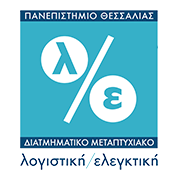Sustainable Accounting – Non-Financial Information
(1) GENERAL
| SCHOOL | SCHOOL OF ECONOMICS AND BUSINESS | ||||
| SECTION | DEPARTMENT OF ECONOMICS AND DEPARTMENT OF ACCOUNTING & FINANCE | ||||
| LEVEL OF STUDIES | POSTGRADUATE LEVEL | ||||
| COURSE CODE | MA09 | SEMESTER OF STUDY | 3 | ||
| COURSE TITLE | SUSTAINABLE ACCOUNTING – NON-FINANCIAL
INFORMATION |
||||
|
INDEPENDENT TEACHING ACTIVITIES |
WEEKLY HOURS TEACHING | CREDIT UNITS | |||
| LECTURES | 3 | 6 | |||
| TYPE OF COURSE | REQUIRED | ||||
| PREREQUISITE COURSES: | NO | ||||
| LANGUAGE OF TEACHING and EXAMINATION: | GREEK / ENGLISH | ||||
| THE COURSE IS OFFERED TO ERASMUS STUDENTS | NO | ||||
| ELECTRONIC COURSE PAGE (URL) | https://eclass.uth.gr/ | ||||
(2) LEARNING OUTCOMES
| • develops a complex way of thinking about the existence, origin and content of
existing sustainable accounting techniques. |
| understands the risks and opportunities for businesses associated with
environmental and social issues • analyses the institutional framework for the accounting recording of non-financial information in Greece and the EU. • study the international literature in the field in question • recognises and applies international models and modern reporting techniques used by businesses and organisations (at micro-level) to recording and disclosing environmental and social information • applies the relevant accounting standards • participate in the academic debate on the new challenges arising from the emergence of these CSR reports |
| • |
| Upon successful completion of the course, the student will be able to:
• understands the conceptual framework of environmental/social and sustainable/sustainable accounting |
| Learning Outcomes |
| • Search, analysis and synthesis of data and information, using both the
necessary technologies • Decision-making • Autonomous work • Teamwork • Working in an international environment • Working in an interdisciplinary environment • Generating new research ideas • Respect for the natural environment • Demonstrate social, professional and ethical responsibility • Promoting free, creative and inductive thinking |
| General skills |
(3) COURSE CONTENT
The accounting of environmental (non-financial) information is one of the current topics of debate among researchers and stakeholders in general.
parties in recent years. In particular, there has been a growing global concern about social and environmental sustainability which, in turn, has highlighted the need to improve the information provided to stakeholders. On this basis, the aim of this course is to introduce students to the basic concepts of sustainable accounting.
First, the conceptual and theoretical framework of non-financial
Information. It also presents the techniques used by companies and organisations to capture this information. In addition, it presents the
official accounting systems, as developed in Greek and European legislation. More specifically, during the course of the course the following modules will be covered:
- Introduction to environmental, social and sustainable accounting
- Accounting models for recording and disclosing information
- European and Greek regulatory and institutional framework for the disclosure of non financial information
- Sustainability reports – GRI Guides – Integrated Reporting – ISO 26000:2010
- Effects of environmental – sustainable policy on strategic planning and the financial structure of enterprises
- Identification of the concepts of environmental and social costs, the
environmental and social output, environmental revenues, the depreciation of assets associated with environmental degradation
- Categorisation of sustainable accounting accounts based on the G.S. and the
E.L.P.
- Accounting treatment of environmental impacts under IAS/IFRS.
- EU institutional initiatives for sustainable development
- Environmental and social performance indicators
- Audit of environmental and social impact reports (green auditing).
(4) TEACHING and LEARNING METHODS – EVALUATION
| METHOD OF DELIVERY | On Site & Distance learning – Hybrid room | |||
| USE OF INFORMATION AND COMMUNICATION TECHNOLOGIES | Use of a hybrid room that includes a large
a wall-mounted screen on which the participants are presented remotely. The connection to the course is made through the Microsoft Teams software, in which a camera is connected to the course. in the room is recorded and illustrated by the teacher. The attendance of the course is also done with the use of the Wacom digital pen, which ensures the interactivity of the lesson with notes that appear directly on the students’ screen. In addition, slides are projected, use of the an asynchronous education platform for the posting of course materials, students’ assignments and communication between teachers and students, search for online journals and resources. |
|||
| ORGANISATION OF TEACHING | Activity | Semester workload | ||
| Lectures | 36 | |||
| Study, preparation and presentation of activities |
110 |
|||
| Study and analysis of the literature
(preparation of lectures & exams) |
31 |
|||
| Final written examination | 3 | |||
| Total Course |
180 |
|||
| STUDENT ASSESSMENT | The assessment is in Greek or in English and consists of a written assignment (individual/group) (40%) and a written exam (60%) at the end of the semester. The examinations include essay development questions as well as
multiple choice questions. An oral examination is foreseen in special cases (e.g. certain cases of students with learning difficulties, etc.). |
|||
(5) RECOMMENDED-BIBLIOGRAPHY
| – Suggested Bibliography:
Bibliography in Greek language • Nikolaou, I. E. and Evagelinos, K. H. (2020). Sustainable business performance accounting. Thessaloniki: DISIGMA Publications.
Bibliography in English |
- Caliyurt, T. (2021). ethics and sustainability in accounting and finance. vol. II. Singapore:
Springer.
- De Villiers, , Hsiao, P. C. K. & Maroun, W. (Eds.) (2020) The Routledge Handbook of Integrated Reporting, London: Routledge.
- Debnath, (2019). Environmental accounting, sustainability and accountability. 1st edition.
New Delhi: SAGE Publications Pvt Ltd.
- Oncioiu, , Cokins, G., Capusneanu, S. & Topor, D. I. (2020). management accounting standrards for sustainable business practices. Hershey, United States: IGI Global.
- Rimmel, (2021). accounting for sustainability. 1st edition. london: Routledge.
- Unerman, , Laine, M. & Tregidga, H. (2021). sustainability accounting and accountability.
3rd edition. London: Routledge.
Academic articles
- Adams, A. & Abhayawansa, S. (2021). connecting the COVID-19 pandemic, environmental, social and governance (ESG) investing and calls for ‘harmonisation’ of sustainability
Critical Perspectives on Accounting, 102309.
- Boiral, O. & Henri, J. F. (2017). is sustainability performance comparable? A study of GRI reports of mining Business & Society, 56(2), 283-317.
https://doi.org/10.1177/0007650315576134
- Boiral, O., Heras-Saizarbitoria, I. & Brotherton, M. C. (2019). Assessing and improving the quality of sustainability reports: the auditors’ Journal of Business Ethics, 155(3),
703-721. https://doi.org/10.1007/s10551-017-3516-4
- Cho, C. H., Laine, M., Roberts, R. W. & Rodrigue, M. (2015). organized hypocrisy, organizational façades, and sustainability Accounting, organizations and
society, 40, 78-94. https://doi.org/10.1016/j.aos.2014.12.003
- Dabbicco, G. (2021). emerging accounting patterns: accounting for natural resources.Public Money & Management, 41(3), 213-222. https://doi.org/10.1080/09540962.2021.1873614
- Fonseca, A. (2010). How credible are mining corporations’ sustainability reports? A critical analysis of external assurance under the requirements of the international council on mining
Corporate Social Responsibility and Environmental Management, 17(6), 355-
- Fonseca, A., McAllister, M. L. & Fitzpatrick, P. (2014). sustainability reporting among mining corporations: a constructive critique of the GRI Journal of Cleaner
Production, 84, 70-83. https://doi.org/10.1016/j.jclepro.2012.11.050
- Palea, V. (2018, September). financial reporting for sustainable development: critical insights into IFRS implementation in the European accounting forum, 42(3), 248-260.
https://doi.org/10.1016/j.accfor.2018.08.001
- Perego, P. & Kolk, A. (2012). multinationals’ accountability on sustainability: the evolution of third-party assurance of sustainability journal of business ethics, 110(2), 173-190.
https://doi.org/10.1007/s10551-012-1420-5
- Sytnik O.E., Kulish N.V., Tunin S.A., Frolov A.V. & Germanova V.S. (2021). accounting as a tool for achieving global sustainable development goals. in Bogoviz A.V. (eds) The
Challenge of Sustainability in Agricultural Systems. Lecture Notes in Networks and Systems, vol 206. Springer, Cham. https://doi.org/10.1007/978-3-030-72110-7_75
- Talbot, & Boiral, O. (2015).
case study among Canada’s large industrial emitters. Journal of Business Ethics, 132(2), 329- 346. https://doi.org/10.1007/s10551-014-2322-5
- Weerathunga, R., Xiaofang, C., Nurunnabi, M., Kulathunga, K. M. M. C. B. & Swarnapali, R.
- N. C. (2020). do the IFRS promote corporate social responsibility reporting? Evidence from IFRS convergence in India.Journal of International Accounting, Auditing and
Taxation, 40, 100336.
– Related scientific journals:
Accounting, Organisations and Society
| Accounting, Auditing & Accountability Journal Advances in Environmental Accounting and Management
British Accounting Review Business Strategy and the Environment Journal of Business Ethics Journal of Environmental Management Sustainability Accounting, Management and Policy Journal |
You may also like
Corporate Governance & Corporate Social Responsibility
(1) GENERAL SCHOOL SCHOOL OF ECONOMICS AND BUSINESS SECTION DEPARTMENT OF ECONOMICS AND DEPARTMENT OF ACCOUNTING & FINANCE LEVEL OF STUDIES POSTGRADUATE LEVEL COURSE CODE MA04 SEMESTER OF STUDY 3 …
Money and Capital Markets
(1) GENERAL SCHOOL SCHOOL OF ECONOMICS AND BUSINESS SECTION DEPARTMENT OF ECONOMICS AND DEPARTMENT OF ACCOUNTING & FINANCE LEVEL OF STUDIES POSTGRADUATE LEVEL COURSE CODE MA34 SEMESTER OF STUDY 3 …

